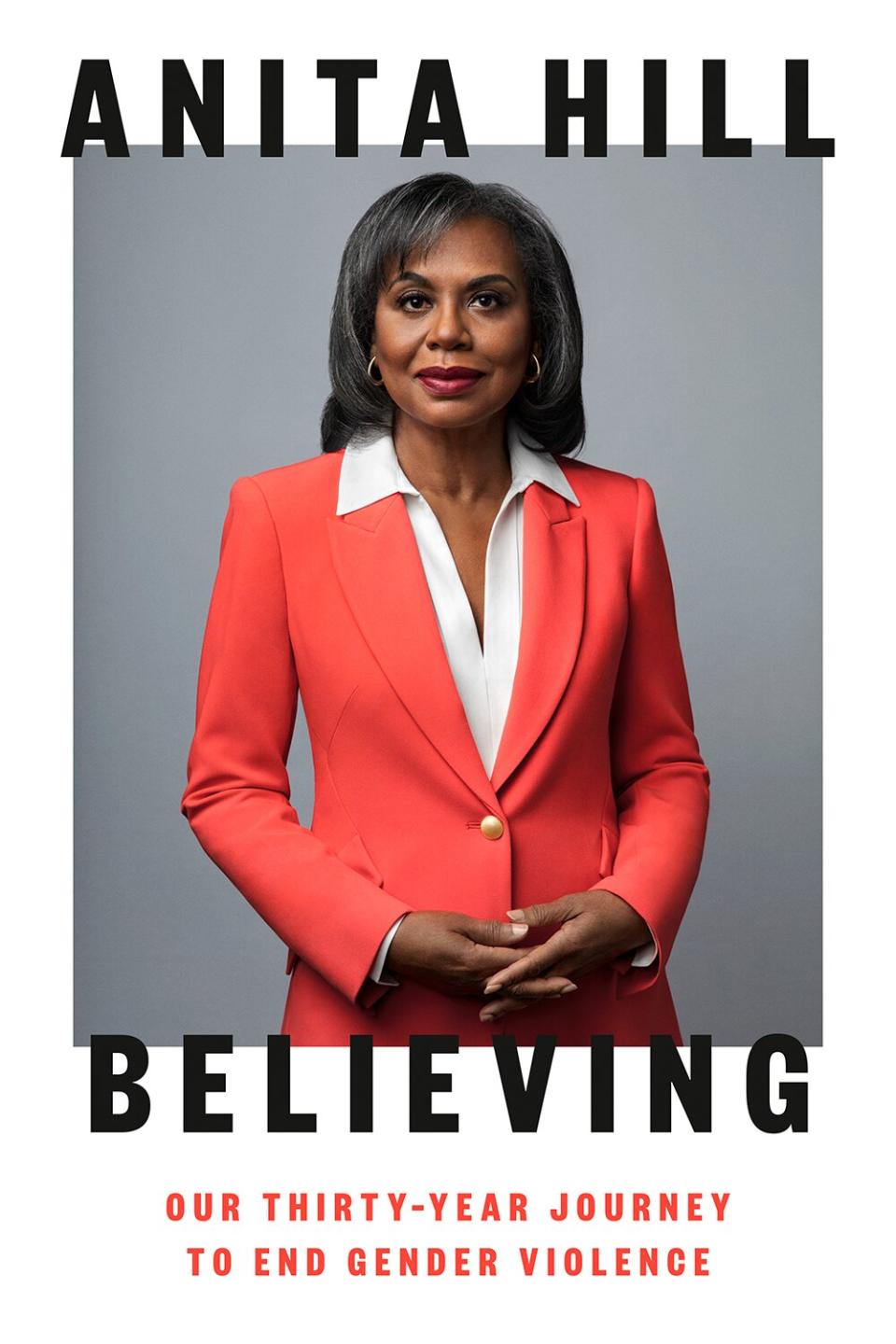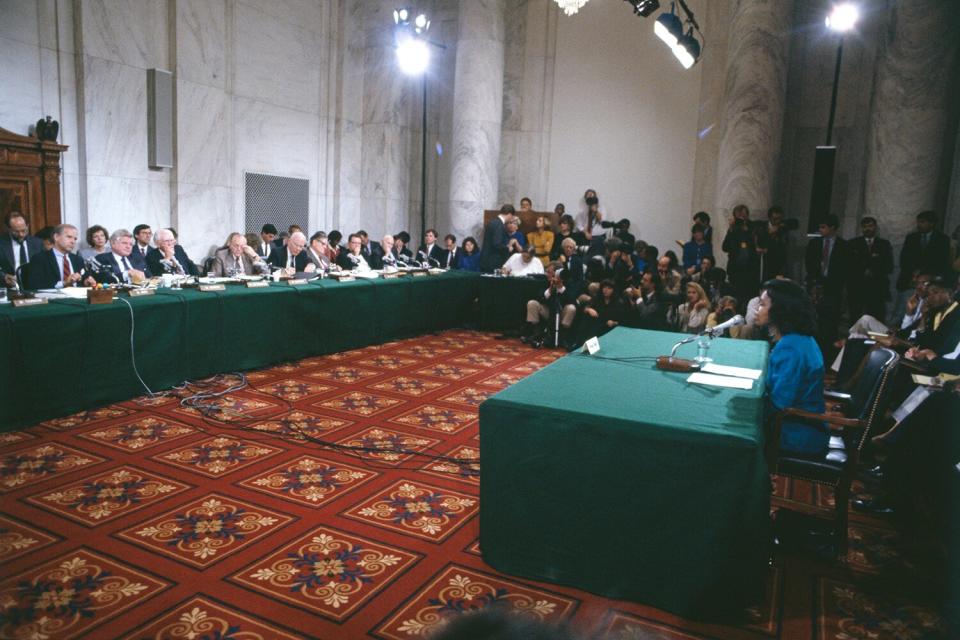Anita Hill on Waiting for Joe Biden's Apology and Her 30-Year Fight Against Gender Violence

- Oops!Something went wrong.Please try again later.
- Oops!Something went wrong.Please try again later.
- Oops!Something went wrong.Please try again later.
Getty Anita Hill
For more than a year, Anita Hill waited for the apology Joe Biden said he owed her for his role in the scrutiny she faced during Clarence Thomas' Supreme Court confirmation in 1991.
In her new book, Believing: Our Thirty-Year Journey to End Gender Violence, Hill writes that she and her partner, Chuck, played a game. After Biden told a journalist about the impending apology in December 2017, each time the doorbell rang, the couple raced to be the first to ask, "Could that be Joe Biden coming to apologize in person?"
The long-awaited call finally came in March 2019, just before Biden announced his presidential run.
"My expectations weren't all that high, anyway. But I suppose I felt some relief that we could put that part behind us and then get to what was really important, which is: What are you going to do about it?" Hill, 65, tells PEOPLE of their conversation.
Biden chaired the Senate Judiciary Committee during the confirmation hearing of then-Supreme Court nominee Clarence Thomas when Hill testified and said Thomas had sexually harassed her. Thomas stridently denied this.
Over the years, the current president, 78, has been criticized for not stopping the outside attacks on Hill during the hearing.
Since her testimony, Hill, now a law professor at Brandeis University, has used her voice to speak out against gender violence, which is the crux of her latest book.

Viking
"[The apology] wasn't just about me. It really was about, How do we stop this problem that I had come to symbolize? How do we address that?" Hill, 65, remembers. "Let's get down to some work and let's figure out what we need to do so that people really believe the apology's sincere."
Hill didn't wait around for Biden's call. "I wasn't relying on permission to move forward," she says. Instead, she's spent the past 30 years as a leading voice in the fight for women's rights and against gender-based violence.
It's a mantle the professor never envisioned for herself. After the hearing, Hill had doubts about how to move forward until she spoke with her friend Lillian Miles Lewis, wife of the late Rep. John Lewis.
Hill realized she needed to use her platform for good. She was also inspired by the wave of people who reached out to share their own stories of pain and abuse. Believing is an expansive, and unsettling, review of the long arc of gender-based violence, far beyond Hill — and it details what she has learned along the way.
"When #MeToo, in 2017 in particular, when that hashtag had exploded, the question was asked, 'Has anything changed since your testimony?' " Hill tells PEOPLE. "And the answer to that is: Yes, but not enough."
While Hill wants gender violence to be addressed at the government level, it also needs to be targeted at other sectors of society, including education, she says.

Jeffrey Markowitz/Sygma via Getty The 1991 hearing
She says she recently got a letter from an elementary school girl who wrote, "My first experience with sexual assault was in first grade. I told the teacher on him and she took away my recess to punish me for being inappropriate."
Right now, survivors expect systems to fail them, Hill says, just as she feels the Supreme Court did when she testified against Thomas' character and, decades later, when Christine Blasey Ford testified about Brett Kavanaugh.
Hill has met with Blasey Ford, a research psychologist and professor at Palo Alto University, who testified that now-Supreme Court Justice Kavanaugh sexually assaulted her at a high school party in the 1980s.
Kavanaugh, like Thomas, emotionally testified in his defense and said that wasn't true.
He was sworn in as a Supreme Court justice in October 2018 after a razor-thin Senate vote to confirm him.
RELATED VIDEO: Biden Had a Four-Letter Reaction When He Found Trump's Giant Video Golf Setup in the White House: Book
Hill says she met with Blasey Ford because they've gone through similar experiences. "Our meeting was about ... being on that hot seat and having people challenging your credibility, and in my case, my sanity, what that was like and the toll that it takes on," she says. "By that time I was years past my experience, but it never goes away. I wanted to be an example of: It doesn't go away, but it does get better, and that on the other side are important things that you can do with the experience that might help other people."
The women's rights activist explains that better processes need to be in place so that sexual harassment claims can be dealt with appropriately, starting with the Supreme Court.
"In my case, they asked me for information and then it just sort of went into this hole," Hill remembers. "I didn't know where it was or what would happen."

Wally McNamee/CORBIS/Corbis via Getty Joe Biden at the 1991 hearing
Hill says a model for proper procedure is the investigation into the allegations against former New York Gov. Andrew Cuomo. (An independent investigation found he had "sexually harassed multiple women," which led to his resignation in August, though he insisted he never knowingly acted inappropriately.)
"The attorney general in the state of New York did a full investigation. I did read the document," Hill says. "From all appearances it was impartial, it was balanced and there was opportunity on both sides to be heard. It was measured ... That is a model."
While Hill's review of gender-based violence is dire, she also wants Believing to serve as a call-to-action. She's inspired by all of the activism she's seen in past three decades and, more recently, through the #MeToo movement and on college campuses.
"The demonstrations do say that there is public outrage enough that it cannot be ignored," Hill says. "There's a reason for that outrage. And if we channel that in the right way, I believe we can make change now."
Believing is on sale now.
